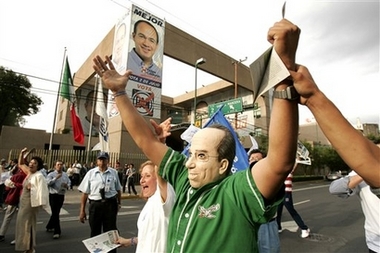Felipe Calderon, a ruling party conservative, won a razor-thin victory on
Thursday in Mexico's presidential election but his leftist rival vowed to
contest the result in the courts and on the streets.

A man wears a mask of
Mexican presidential candidate Felipe Calderon of the National Action
Party (PAN) as they celebrate in the streets in front of Calderon's
campaign headquarters in Mexico City, Mexico, Thursday, July 6, 2006.
[AP] |
Calderon was elected with 35.89 percent of the vote while Andres Manuel Lopez
Obrador, a combative left-wing former Mexico City mayor, trailed just behind on
35.31 percent.
Lopez Obrador angrily claimed the election last Sunday was plagued with
irregularities and pledged to challenge it in Mexico's electoral court.
He also called a rally of supporters in Mexico City's vast central square for
Saturday, raising fears of street protests and unrest as well as weeks of legal
wrangling similar to that which followed the U.S. presidential election in 2000.
"We cannot recognize or accept these results," he said.
Calderon, 43, tried to ease the growing political crisis by promising to work
with opposition parties as president and asking his adversaries to forget the
ugly election campaign that divided Mexico between left and right.
"If the contest is behind us, our differences are behind us. Now is the hour
for unity and agreements between Mexicans," the former energy minister and
Harvard graduate said.
He is likely to be a key U.S. ally in Latin America, where leftist leaders
have taken power in Argentina, Bolivia, Brazil, Uruguay and Venezuela and
quickly turned away from Washington.
At home, Calderon promises to clamp down on violent criminals and powerful
drug trafficking gangs as well as create millions of jobs with pro-business
reforms, more foreign investment and a boom in construction.
Calderon's come-from-behind victory was a cliffhanger.
He only overtook Lopez Obrador in the official count when almost 98 percent
of votes had already been tallied. The final margin of victory was around
240,000 votes, tiny in a nation of over 100 million people.
He was the clear favorite of investors and Mexico's financial markets jumped
on news of his victory. The stock market was up 2.7 percent in afternoon trade
and the peso currency gained 1.6 percent.
Investors are optimistic that Lopez Obrador can do little to change the
result, even with legal challenges. But he is seen by leftist voters as a
candidate of the rich and some are convinced he beat Lopez Obrador with fraud.
"ROBIN HOOD"
In Mexico City's Pensil neighborhood, a working-class warren of dilapidated
tenements and greasy car repair shops that staunchly backs Lopez Obrador, the
mood was somber.
Angry supporters gathered in doorways and on street corners raging against
the electoral institute and Calderon's party. One bewildered group thronged
around a newspaper stand, staring incredulously at front page pictures of a
jubilant Calderon.
"It's as if somebody stole your child," said taco seller Beatriz Montoy,
vowing to attend Saturday's rally to support the man she referred to as her
"Robin Hood."
"We're not going to let them do this," she said. "There is going to be an
avalanche of people."
Lopez Obrador, 52, led the count for hours but Calderon overtook him in the
early hours of Thursday as the last votes came in from his strongholds in
northern and western Mexico.
Hundreds of supporters, many of them young professionals dressed in suits or
fashionable jeans, packed into Calderon's party offices to toast his win with
champagne and tequila.
The narrow victory margin and months of animosity between left and right have
many fearing weeks of legal battles and massive street protests ahead.
"If a revolution is needed, a revolution there will be," said Guadalupe
Tellez, a 53-year-old Lopez Obrador supporter who wept outside Lopez Obrador's
modest Mexico City apartment. "He is the only person who wanted to help the
people."
Lopez Obrador was the red-hot favorite for most of the campaign, but Calderon
closed the gap by painting his rival as a danger to Mexico's economic stability
and linking him to anti-U.S. firebrand Venezuelan President Hugo Chavez.
Lopez Obrador pledged to help Mexico's poor with welfare benefits and
ambitious infrastructure projects to create jobs.
He won wide support in Mexico City but his spending policies worried
investors, business leaders and many middle-class families. He also failed to
make major inroads in traditionally conservative northern Mexico.